Botswana’s Ministry of Health strives to improve the physical, mental and social well being of every Motswana citizen to fully contribute to the development of Botswana through a healthy nation. Nationally, over 95% of the country’s population live within 8 kilometers of a health facility.The public sector is the predominant provider of health care services in Botswana, with more than 80% of people receive care from public facilities and programs.
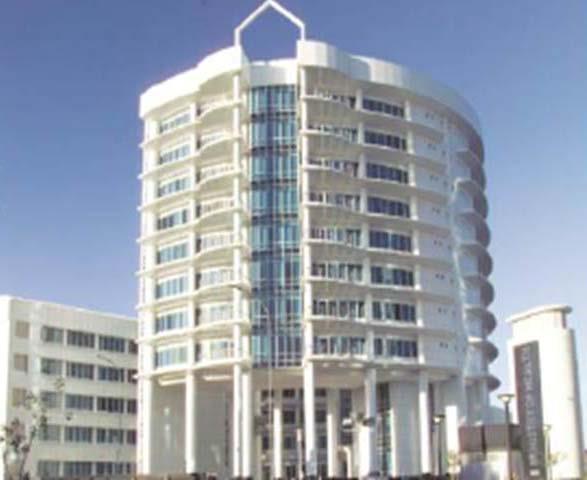
Botswana Ministry of Health Facilities
The Ministry of Health is located in the Central Business District, in Gaborone Botswana less than 10 kilometers from the University of Botswana. There is a dedicated NCD Division within the Ministry of Health. The Ministry of Health has numerous conference rooms, teleconferencing ability, and fully networked facility with internet access throughout the building.
Ministry of Health Staff
The Permanent Secretary of the Ministry of Health and the NCD Division team members will actively devote effort toward this project, as the Planning Unit will be housed within the Ministry of Health. All salary support for Ministry of Health personnel to carryout functions of the Planning Unit will be derived directly from the budget of the Ministry of Health.
Ministry of Health Electronic Health Systems and Data Repositories
Botswana Ministry of Health (BMOH) has consolidated the number of electronic Health Information Systems (eHIS) capturing BMOH data, to improve interoperability of those systems and improve data utilization. Botswana’s existing eHISs were initially designed as a result of President’s Emergency Plan for AIDS Relief (PEPFAR) in the setting of one of the most pervasive AIDS epidemics in the world. They were designed to provide electronic HIV diagnosis, treatment and outcomes data. Two systems were developed, collecting disaggregated patient data. The two systems operate in parallel currently and are managed by BMOH’s Health Informatics Unit. The first, a locally developed system called the Patient Information Management System (PIMS), is a stand-alone electronic medical records (EMR) system that was developed to operate on Local Area Network (LAN) for health facilities that lacked internet connectivity. The system currently has modules for HIV care and treatment, prevention of mother-to-child HIV transmission, cervical cancer, family planning and documentation of users of the safe male circumcision program, but is not generally used for routine health visits. PIMS is currently the most decentralized system, available in the majority of health clinics. The second system, Integrated Patient Management System (IPMS), is a comprehensive healthcare information system, customized locally by MEDITECH South Africa IPMS. This system is available in most primary hospitals, all district hospitals and both referral hospitals facilities in Botswana, as well as 8 Diabetes Centers of Excellence. IPMS allows for inter-facility viewing and central collection of data, however the IPMS system is completely proprietary and requires technical programming support from South Africa. The Ministry of Health Informatics Unit has sufficient budget and political mandate to pay for any NCD programming adaptions that will be required. This conforms with the formal eHealth strategic plan.
Botswana Harvard AIDS Institute Partnership (BHP) was established 1996 and formed from a partnership between Botswana’s Ministry of Health and Harvard School of Public Health. While the original partnership was structured to build HIV lab capacity and expertise, the current mission of BHP is to support Botswana public health research, education prevention and treatment services program. BHP is remains heavily involved in HIV research, but has expanded its public sphere presence working on cardiovascular, oncology, birth outcomes, and nutrition projects, as well. In addition to research, it has staffed a full-time Internist at Scottish Livingstone Hospital (SLH), a district hospital located one hour outside the capital city. BHP will soon add a full-time Obstetrician to the SLH staff, as well. BHP employees assigned to SLH and have adjunct appointments at the University of Botswana, Faculty of Medicine. In this capacity, they routinely supervise and mentor medical students, interns and residents at SLH.
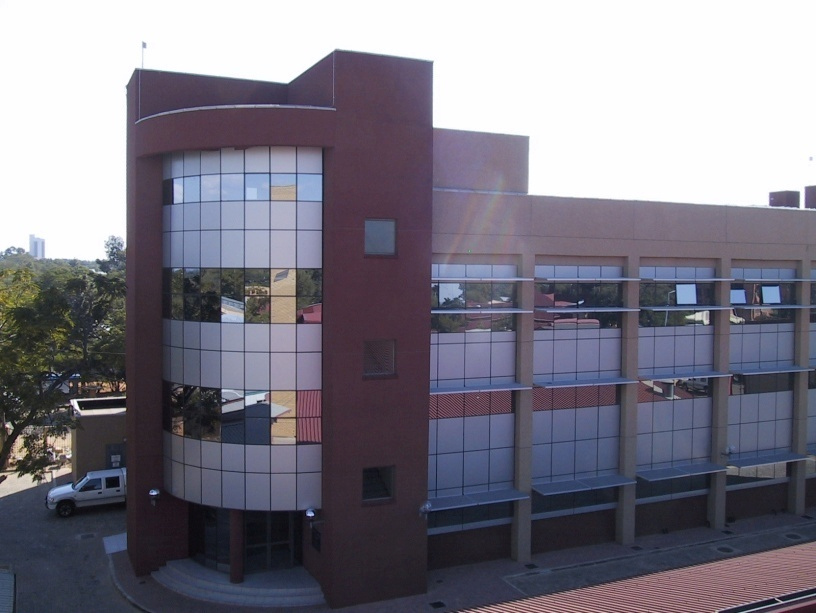
Botswana Harvard AIDS Institute Partnership
BHP has over 300 staff members, including 23 at the doctoral level. Harvard maintains an agreement with the Ministry of Health in Botswana, initially signed in 1996 and renewed since then in 5-year terms.
BHP Facilities
The main headquarters of BHP, including the Botswana Harvard HIV Research Laboratory (BHHRL) is located on the grounds of the main public hospital in Botswana, Princess Marina Hospital, in the capital city of Gaborone. The building is a three-floor, 25,000-square-foot facility consisting of laboratory and office space, conference rooms, and storage and service areas. The laboratory area consists of 18 rooms with different functions. Laboratory staff includes a PhD laboratory director, a PhD deputy director, a MSc laboratory manager, 6 research assistants, 10 research technicians, and an average of 5 postdoctoral fellows and/or doctoral students. In addition, BHP Systems Development and Information Technology team has office space in the headquarters. There four clinical sites on the campus of Princess Marina that are fully occupied by BHP clinical research staff conducting randomized clinical trials and observational studies.
BHP has clinical and laboratory research facilities at Nyangabwe Referral Hospital, located in Francistown and serving Northern Botswana. This is site predominantly conducts maternal- child health research presently.
In addition, BHP is conducting a 30 community interventional trial and has two mobile teams of 32 research associates, support and supervisory staff traveling from community to community throughout the country, imbedded in the community for 20-30 days before moving to the next community.
Grants Management
BHP manages all of its own grants administration, with a Grants Manager and a staff of 5 individuals. The BHP Grants Management Department is currently managing 32 grants and has passed all annual audits conducted by an external agent without exception. This team has worked with the collaborating parties to the current grant application to prepare the submission and will manage all facets of the grant under the umbrella of the Coordinating Unit.
Regulatory Oversight
BHP has a Regulatory Department staffed by a senior Regulatory Officer and a Regulatory clerk. This team ensures that all IRB filings are submitted in a timely manner, that proper IRB and Ethical Committee approvals have been received in writing prior to the opening of any research study, that request for continuing review of a study are filed annually and that all study staff are compliant with Human Subjects and Good Clinical Practices training. In fact, the Regulatory Office, from time to time, conducts Human Subjects and Good Clinical Practices training. The Regulatory Office routinely audits studies underway at BHP to ensure that study practices conform to the study protocol and standard operating procedures. The Regulatory Department has been audited by external monitors employed by NIH and CDC and has consistently received outstanding reports. The Regulatory Office will provide regulatory oversight of this grant, as outlined in the Coordination section of this grant application.
Systems Development and IT Infrastructure
The Director of Systems Development and Information Technology has a staff of 6 systems programmers and 5 Information Technology (IT) technicians. The Systems Development team has developed a customized electronic data capture (EDC) and storage application that is used on the majority of BHP studies. Embedded logic comparing fields within and between forms in the same study visit and between forms over longitudinal visits has result in capturing of high quality of data at the point of contact with a study client and has prevented missing forms/data. This has allowed BHP to move quickly, after completion of a portion or all of a study, to data analysis and publication. Applications designed by the team can operate such that data is being centrally collected in real time where adequate internet functionality exists or in asynchronous modes in the absence of internet connectivity, with the ability to later synchronize to a central server over firewall protected and encrypted data networks.
The BHP IT staff manage a network of computers, laptops and notebooks throughout Botswana. As a result of a collaboration with the Centers for Disease Control and Prevention, BHP is conducting a three year longitudinal study called the Botswana Combined Prevention Projectf (BCPP). The goal of this project is to eliminate new HIV-infections in communities receiving a combination of HIV preventative and care services. The project includes 30 communities in Botswana that are scattered throughout the country. BHP installed the necessary equipment to ensure internet access in the main health center in each of the 30 communities, must of which rely on PIMS2 for the electronic health management system. In addition, the IT team has worked with CDC and the Ministry of Health to integrate data from disparate sources into a research data warehouse, so that the researchers involved in this project can easily access and analyze data collected in the routine course of this study from multiple systems. This expertise will be employed to recommend a data integration platform for the NCDs RCRE.
BHP has video-teleconferencing equipment and a subscription to WebEx supported by funds from the Botswana Oncology Global Outreach Program (BOTSOGO). This equipment is used monthly to conduct Tumor Board meetings attended by Oncology and Surgical staff in Gaborone and Massachusetts General Hospital, where cases can be discussed and teaching is offered. We would plan for the NCD research cadre to use the WebEx service and equipment to present research in progress monthly to mentors at University of Pennsylvania, Harvard University, and Witswatersrand University. Interested NCD program managers in the region will also be invited to participate in this video based teleconferencing.
Research Cohorts
Over the time that BHP has been conducting research, it has obtained permission from study participants to store their biological specimens for subsequent research use. This biorepository could be accessed by the NCDs RCRE for pertinent NCD research. Furthermore, BHP has established a Botswana Prospective Cancer Cohort under the principal management of Dr. Scott Dryden-Peterson, a party to the proposed grant application. This cohort is funded through support from the Paul Allen Family Foundation and NCI/NIAID grants. Data from this cohort will be used for the planned breast cancer research study during the course of the two-year grant and will likely prove invaluable to future cancer research undertaken by NCDs RCRE personnel in the longer-term.
Community Advisory Board
BHP maintains a Community Advisory Board (CAB) which is supported by separate grant structure at BHP. The meets quarterly or more frequently if needed, proposed research agenda for BHP and provides feedback on planned studies. They received feedback on outcomes of studies that have been conducted by BHP. The CAB is available to the NCDs RCRE for advice on planned research and approaches to community engagement.
The overall mission of the Botswana-UPenn Partnership (BUP) is to help build capacity in healthcare in Botswana. The University of Pennsylvania (Penn) has worked in Botswana since 2001; it currently employs more than 100 full-time staff in country, most of whom are citizens of Botswana. The Partnership works with the Ministry of Health (MOH) and the University of Botswana (UB) to build local capacity initially in response to the HIV/AIDS epidemic but now on a broader level, to provide high-quality medical care and medical education throughout Botswana. The Partnership serves as a project incubator by providing connections and support to projects of local interest in Botswana to faculty, alumni, and departments at Penn that can provide advice on how to bring ideas to fruition.
BUP is overseen by the Director, Dr. Harvey Friedman, Professor of Medicine/Infectious Diseases at the University of Pennsylvania, and led in Botswana by Country Director Dr. Doreen Ramogola-Masire, Clinical Associate Professor of Obstetrics and Gynecology at the Perelman School of Medicine, University of Pennsylvania with a secondary appointment as Associate Professor of Obstetrics and Gynecology at the University of Botswana. Penn is taking a broad interdisciplinary approach to train healthcare personnel in Botswana, and to develop joint research programs that address issues relevant to the health and welfare of the citizens of Botswana.
Development of oncology programs in Botswana has been a priority for BUP. With support form the National Cancer Institute, Center for Global health and UPenn, BUP has a full time oncology faculty member, Surbhi Grover, based in Botswana. She works closely with a radiation oncologist (Memory Bvochora-Nsingo) and a clinical oncologist (Sebathu Chiyapo) in country.
BUP investigations in trauma are an emerging focus in Botswana. UPenn offers substantial international experience in developing trauma research programs (Doug Wiebe, Epidemiologist, Penn Center for Clinical Epidemiology and Biostatistics) and has been working with Emergency Medicine and Trauma Surgery faculty at the University of Botswana School of Medicine, to establish their program.
BUP Staff Resources
The following BUP faculty live full-time in Botswana and possess clinical care and research expertise that would benefit the NCDs RCRE in Southern Africa:
Doreen Ramogola-Masire, MD, Clinical Associate Professor of OB/GYN, Perelman School of Medicine, Associate Professor of ObGyn, University of Botswana, Country Director, Botswana- UPenn Partnership, Lead Physician, Women’s Health Program
Surbhi Grover MD MPH, Assistant Professor of Radiation Oncology, Perelman School of Medicine
Miriam Haverkamp, MD, MPH, Clinical Assistant Professor of Medicine, Perelman School of Medicine, ID Specialist, HIV and Global Health Programs, Botswana-UPenn Partnership
Joseph Jarvis, MD, PhD, Adjunct Assistant Professor of Medicine, Perelman School of Medicine ID Specialist and Epidemiologist, Botswana-UPenn Partnership
Chawa Modongo, MD, Clinical Assistant Professor of Medicine, Perelman School of Medicine Lead Physician, Adult TB Program, Botswana-UPenn Partnership
Chelsea Morroni, MD, PhD, Women’s Health Specialist, Botswana-UPenn Partnership
Giacomo Paganotti, PhD, Adjunct Assistant Professor of Medicine, Perelman School of Medicine, Lab Director, Joint University of Botswana and University of Pennsylvania Laboratory
Nicola Zetola, MD, Assistant Professor of Medicine, University of Pennsylvania
Tonya Arscott-Mills, MD, Clinical Assistant Professor of Pediatrics, Perelman School of Medicine, Lead Physician, Pediatric TB and Clinical Research Programs, Botswana-UPenn Partnership
Ari Ho-Foster, MSc, Epidemiologist and Chief Operations Officer, Botswana-UPenn Partnership, Adjunct Assistant Professor of Medicine, Perelman School of Medicine
Ryan Littman-Quinn, Director, Health Informatics, Botswana-UPenn Partnership
BUP Facilities
The BUP main office is located on the UB campus and is staffed by an administrative team under the leadership of Operations Director Ari Ho-Foster who reports to the country director Dr Ramogola-Masire and BUP Director, Dr Harvey Friedman. This office handles finance, human resources, fleet management, IT and other operational needs to support the 100 staff in Botswana working to implement BUP’s assorted programs. The BUP Philadelphia office provides grants management oversight.
The BUP rents a number of facilities, owns multiple portable office units to support the ongoing work in Botswana, and has clinical and office space within several MOH facilities. These include:
Main Office – UB Campus 244G: The BUP Botswana headquarters office is located on the UB campus in close proximity to offices of the Faculty of Medicine, classroom facilities in the Faculty of Health Sciences Building and the shared laboratory space. This serves primarily as faculty and administrative office space on UB campus and includes 16 offices and a conference room.
Lab Space - National Health Lab: The BUP has a lab with approximately 500 net square feet in space provided by the MOH National Health Lab near Princess Marina Hospital (PMH). The lab contains equipment such as laminar airflow hoods, -80C freezer, -20C freezer, centrifuges, a PCR machine, and a GeneXpert machine.
Lab Space - Faculty of Health Sciences Building at UB: The BUP shares a large, 1000 net square foot lab containing state-of-the-art equipment for molecular biology research with researchers at UB.
Main Research Office – 214 Independence Avenue: The research office is located near the city center and includes six offices and a large open area with work cubicles and onsite parking which is useful for safely securing vehicles used in research and outreach. On the property we have a portacabin (owned by BUP) with two research offices and a clinical trials pharmacy. All offices on this property benefit from redundant power supplied by a 30kVA diesel generator.
TB Research Office – UB Campus: The BUP owns a portacabin with six offices and a conference room used by the TB research team. The BUP owns five additional 1-room portacabins located adjacent to MOH Health Clinics that are used to enroll subjects into TB research studies.
Women’s Health Clinic – Princess Marina Hospital (PMH): Princess Marina Hospital is the main referral hospital in the country. The Women’s Health clinic is an MOH clinic that is staffed by MOH nurses and BUP OBGYN specialist, Dr. Ramogola-Masire. The clinic is contiguous to the PMH HIV clinic, the busiest HIV clinic in the country and provides clinical care, anti-retroviral therapy and follow up to over 5,000 patients per year. The BUP’s Women’s Health Clinic has four consulting rooms, one counseling room, a waiting room, and an administrative room, as well as a conference room. All the required equipment to perform colposcopy, punch biopsy and loop electrosurgical excision procedure (LEEP) are available. Patients can be referred with ease for cone biopsy, hysterectomy as well as radiation to the Gynecology and Oncology departments within PMH. Our base population is approximately 2,000 HIV-infected women per year.
Motor vehicle fleet: The BUP also maintains a fleet of 14 cars that are used in various programs and research projects.
Data Management
The BUP brings considerable informatics and data management skill and infrastructure scalable to meet the needs and sophistication of most studies. For establishing and implementing clinical trial data management for small and large studies, our in-house personnel bring skills and experience in SOP development and implementation; data format design, training and implementation for collection by mobile device, paper (written or Optical Mark Recognition (OMR)-scan-able data collection format); single or validated double data entry management for manual entry instances; data quality and routine data quality audits; stand-alone or server- based data management; and policy-driven data archiving and destruction.
As leading implementers of mobile health informatics solutions, we also bring expertise in developing and implementing data gathering solutions that are rapidly customizable to meet nearly any environment or context.
Research Programs
The Penn CFAR International Core, under the Direction of Dr. Harvey Friedman, was established to promote innovative research critical to better understanding the global nature of the HIV epidemic. The Core provides leadership in developing HIV/AIDS research in Botswana, with the specific aims:
To expand infrastructure and support in order to establish and maintain strong clinical, behavioral, and translational research programs in Botswana involving Penn and Batswana investigators.
To train investigators from Penn and Botswana who are interested in international research.
The International Core is under the co-direction of Andrew Steenhoff, a Pediatrician trained in Infectious Diseases, and Dr. Tonya Arscott-Mills, a pediatrician with expertise in Pediatric TB. The services provided to researchers in Botswana include: feasibility assessments, supervision of research staff, storage and shipment of specimens, liaison to UB researchers, and regulatory management. Local investigators have published more than 170 papers with assistance from the BUP and the Penn CFAR since 2004, with approximately 30 publications annually in the past 4 years.
BUP along with various UB and UPENN faculty was recently awarded an NIH NCI U54 grant to support three large studies on cervical cancer and HIV over the next 5 years. This a program project grant with a major goal to build capacity in Botswana as the project is implemented. In this grant the inter-disciplinary research consortium will focus on multiple areas of study related to one cancer type, HPV-associated cervical cancer in HIV seropositive patients as well as building research capacity in Botswana through a strong emphasis on mentoring and education. The Consortium will bring together experienced investigators from UB and UPENN with expertise in mentoring, research methodology, viral oncology, cancer therapeutics, and behavioral studies. An accompanying major focus will be on developing sustained research infrastructure in Botswana. This will be an opportunity to build independent research capacity at UB related to cancer in HIV-positive individuals. Furthermore, there are several other clinical and translational oncology studies ongoing through BUP funded by the UPenn Center for AIDS research and the American Society of Clinical Oncology to further understanding of cancer outcomes and biology in Botswana and to train clinical researchers in Botswana.
Clinical Programs & Technical Advising
The BUP with current PEPFAR funding serves as technical advisors for four major clinical areas: HIV Care & Support, Adult & Pediatric TB, Women’s Health, and mHealth.
HIV Care & Support Program: This program was started in 2003 to provide technical support for the national rollout of antiretroviral therapy treatment for HIV-infected citizens. The Program Head is Dr. Miriam Haverkamp who is an Internist trained in Infectious Diseases and has some medical oncology experience. The current goal of the program is to improve the quality of care received by HIV-positive individuals with co-morbid conditions and complications of chronic disease.
TB program: The Program Head of the TB program is Dr. Chawa Modongo, an Internist who trained in Ireland. She works closely with Dr. Arscott-Mills, lead physician of the Pediatric TB program. Both Drs. Modongo and Arscott-Mills are full-time Penn faculty who live in Gaborone. The BUP TB program includes technical assistance engagement at the health facility, district and national level. At the facility level, the program is: i) Providing onsite mentoring at least monthly at the 63 high volume priority sites to increase HIV testing of TB patients, initiation of TB-HIV co-infected patients on HAART, and ensuring access to and retention in HIV care; ii) Providing Site Improvement through Monitoring Systems (SIMS) remediation at 63 high volume priority sites; and iii) Supporting intra-facility TB infection control efforts. At the district level, BUP’s TB program is providing technical assistance in TB/HIV training for both high and low volume focus sites to increase TB case detection in the entire population through use of GeneXpert platforms, and engaging communities and health facilities in TB screening with special emphasis on TB screening among people living with HIV/AIDS. BUP provides technical assistance to the MOH on National TB-HIV Policies and Guidelines.
Women’s Health: The BUP Women’s Health Program was established in 2009 and is led by BUP Country Director, Doreen Ramogola-Masire, MD who lives in Gaborone and is Motswana. She worked closely with Chelsea Morroni, MD, PhD, who has a strong interest in family planning and reproductive health. The BUB Women’s Health program collaborates with the MOH to implement Botswana’s “See & Treat” approach for cervical cancer prevention. Current projects include: i) Providing cervical cancer prevention services for HIV-infected women using visual inspection after acetic acid with enhanced digital imaging; ii) Providing treatment of precancerous cervical lesions using cryotherapy administered by nurses and loop electrical excision procedure provided by doctors; and iii) Providing technical assistance to the MOH for other women’s health issues including advising on national HIV issues, maternal mortality issues, and HPV vaccination in Botswana. With the arrival of Dr Grover, a post-treatment cervical cancer follow up clinic has been added to the services provided at the women’s health clinic.
Telemedicine & mHealth: Carrie Kovarik, MD, Associate Professor of Dermatology, University of Pennsylvania launched the BUP tele-dermatology program in 2007, which has expanded into a broad telemedicine program that seeks to circumnavigate the challenging IT infrastructure in the region and a severe shortage of healthcare workers, particularly specialists. She works closely with the BUP telemedicine group led by Ryan Littman-Quinn and Kagiso Ndlovu in Gaborone.
BUP Accomplishments in Capacity Building: The BUP has worked to build healthcare capacity for 15 years. The disease burden in the earliest days of the HIV epidemic was so great that much effort was devoted to direct patient care when people were so sick and the existing healthcare system was so overwhelmed. But even then, Penn and BUP faculty recognized that in order to make a lasting change, investment was necessary in building local healthcare capacity. From the earliest days, BUP faculty incorporated bedside teaching into every patient encounter where a healthcare worker was present to learn. And since then the BUP has made lasting improvements to healthcare knowledge and capacity overall in Botswana through capacity building efforts.
Site of the Southern African Regional Center of Non-Communicable Diseases Research Excellence
The Southern African (NCDs) Regional Center of Non-Communicable Diseases Research Excellence (RCRE) will be housed within the Faculty of Health Sciences and report to the Dean of Health Sciences on the campus of University of Botswana, located in Gaborone, the capital city of Botswana.
The Faculty of Health Sciences was established in 2007 and includes the School of Nursing, the School Medicine, School of Allied Health Professions and the School of Public Health. The faculty offers undergraduate and postgraduate training in basic medical sciences and clinical disciplines. The Faculty is engaged in basic and applied health research in areas including genomics, epidemiological surveys, and clinical research. The staff has received international recognition for research in HIV/AIDS. Despite the fact that the Faculty of Health Sciences is relatively new, staff members have significant experience and many have published extensively in high impact journals spanning the medical, nursing, public health and basic science fields. The Faculty of Health Sciences is home to the World Health Organization (WHO)-accredited Centre of Excellence in Nursing and Midwifery Education and a Centre for HIV Studies in Africa. The Faculty of Health Science routinely engages with communities in Botswana to understand clinical and public health needs and design programs to enhance services.
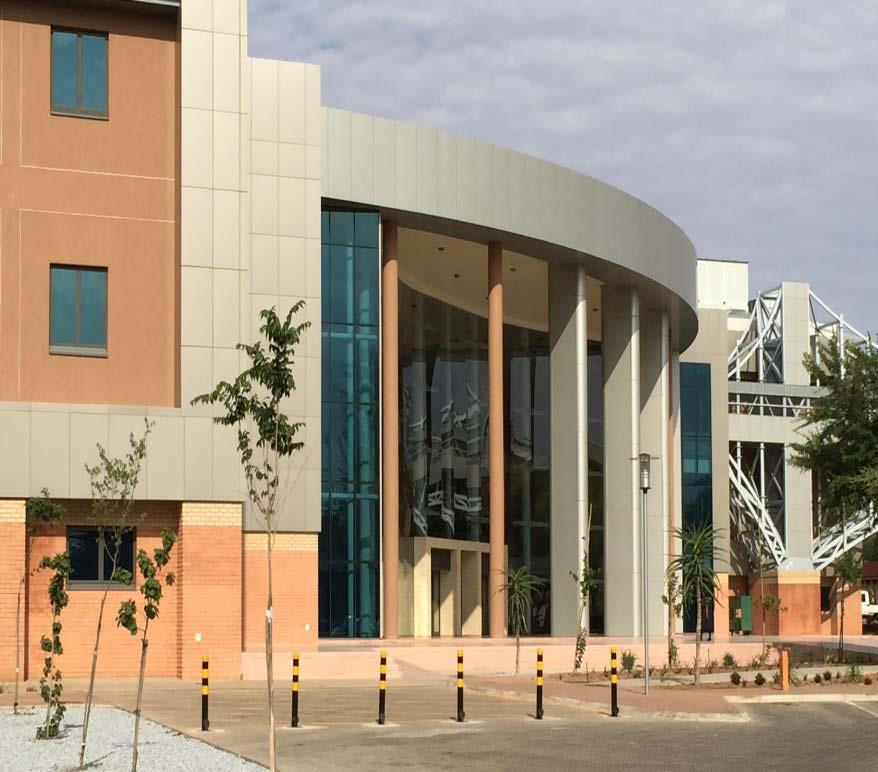
Faculty of Health Sciences ‐ Teaching and Research Facilities
The Faculty of Medicine has grown from a School of Medicine launched in 2009. Included in the mission of the Faculty of Medicine is to prepare physicians to apply technological innovation to the health care needs of individual patients and their families, with the overriding goal to enhance the health of the people of Botswana. In total, over 100 academic staff members are employed within the Faculties of Health Sciences, Medicine and Public Health with expertise in medicine, nursing, basic medical sciences and public health.
The Faculty of Health Sciences building has laboratory facilities and teaching facilities for both undergraduate and graduate training at the levels of bachelor, Masters and PhD degrees. The building houses a sophisticated functional laboratory currently used jointly by the staff in the faculties of health sciences, medicine, science and UPenn. A quarternary level Academic Teaching Hospital, with large trauma, oncology and general medicine units, has recently been completed and will add to the existing clinical, teaching and research facilities at the University of Botswana for the proposed RCRE.
Instructional Resources for the NCDs Regional Center of Research Excellence
The Dean of the Faculty of Health Sciences, a co-Principal Investigator to this project, Prof Yohana Mashalla, will oversee curriculum development for NCD researchers. Established biostatistics and epidemiology course curriculum, currently taught by members of the Faculties of Health Sciences, Public Health and Social Sciences at UB and at University of Witwaterstand (Wits), will be adapted to include an NCD focus, with input from collaborating Biostatisticians and Epidemiologists from University of Pennsylvania, Harvard University and Boston University. The Dean of the Faculty of Health Sciences will allocate dedicated classroom space. While NCD researchers will benefit from the curriculum and coursework, it is anticipated that other students attending UB and Wits will be permitted to enroll in these courses, as well. The salary for faculty selected to teach NCD research curriculum is already covered by UB, and does not require budget expenditures from this grant.
NCDs Regional Center of Research Excellence Working Space
The initial cadre of six NCD researchers will be provided with dedicated office space within the Faculty of Health Sciences facility. Six computers will be purchased through this grant for use by the researchers. Statistical software and other required office supplies and equipment will be purchased to support the needs of the researchers. The team of researchers will have access to teaching space and conference rooms, as needed to conduct meetings. There is sufficient office space for further growth of the RCRE. It is anticipated that future equipment needs can be supported through NCD research grant funding, endowments or directly allocated budgets from the UB, Botswana’s Ministry of Health, Botswana’s Ministry of Education, Wits or other regional partners benefiting from studies conducted by the RCRE.
Data Support
The entire University of Botswana campus has internet connectivity (including Wifi), with high bandwidth. The campus is secure 24 hours daily and measures for ensuring cyber-free hacking have been put in place. UB subscribes to SCOPUS, one of the largest abstract and citation databases of peer-reviewed publications. The team of NCD local researchers will be able to perform literature searches through SCOPUS.
The UB’s Department of Computer Sciences will work closely with the collaborators of the grant to create or adapt health informatics for this project, assisting with development of applications that will enhance NCD data acquisition at point of care, facilitating data integration from multiple systems within and outside the country, and adapting data to meet the needs of the individual researcher. The RCRE affords the Computer Science department the opportunity to provide practical projects to its Master level and undergraduate students, under the mentorship of system development experts from Botswana-Harvard AIDS Institute Partnership (BHP) and Botswana-U Penn Partnership (BUP).
Research Co-Funding
Masters and PhD level students of UB can apply to UB for funding of up to US$2,000 for research projects per annum. UB Faculty can apply individually for funding of research projects up to a maximum of US$5,000 per annum or, for collaborative projects between University faculty members, up to a maximum of US$20,000 per annum.
As noted in the Coordinating Unit section of this grant, the Coordinating Unit (as part of their grants administration services) will routinely circulate NCD funding opportunities for which research can apply and support the application process. It is anticipated that this service will also expand the available pool of grants funding for the RCRE.
Endowments
There are no current plans for endowed funding of the RCRE. However, the grant calls for an initial needs assessment. Included in the needs assessment will be a review of sustainable sources of funding for the RCRE. It is anticipated that recommendations for the UB to pursue endowment funding sources will arise out of the needs assessment and represent an activity that will be carried out concurrently during the two-year planning phase of the grant.
Faculty Appointments, Salary Support and Protection of Research Time
The Dean of the Faculty of Health Sciences has the authority and funding create and hire faculty positions within his division. Individuals who will support the RCRE will be hired through the Faculty of Health Sciences. Currently, contracts specify the percentage of time that a Faculty of Health Science staff member should allocate to their designated activities, including research, teaching and community engagement. Researchers hired specifically for the RCRE will be required to devote at least 60% effort to NCD research activities and their time will be protected accordingly.
Designation of the Center Program Status in Institutional Bylaws
The Dean of the Faculty of Health Sciences, with support from Botswana Ministries of Education and Health, will explore formal designation of the RCRE into University of Botswana’s bylaws during the course of the two-year planning phase of the grant.
Overview and Research Capacities
The Faculty of Health Sciences offers professional undergraduate degrees in Medicine, Dentistry, Nursing, Pharmacy, Physiotherapy and Occupational Therapy. Through its partnership with the Gauteng Health Department, Wits employs over 800 medical and dental consultants who are involved in teaching undergraduates and postgraduates and in the research programmes. Approximately 500 students graduate in these professions each year.
The Faculty of Health Sciences is well known for its internationally recognised, cutting edge research, which is conducted through 18 research entities and a Centre of Excellence, five DST/NRF South African Research Chairs and many individual researchers who are involved in relevant basic and applied research in all fields of health sciences. The Faculty is one of only two Health Sciences faculties in Africa to have been published extensively in high impact journals such as the New England Journal of Medicine, Nature and Cell. The Faculty of Health Sciences is home to one of the South African Medical Research Council Centres of Excellence and five Department of Science and Technology/National Research Foundation South African Research Chairs. There are currently 21 research entities based in the Faculty, two Research Thrusts (Diseases of Lifestyle and Molecular Biosciences) and three Centres of Excellence supported by the Faculty. The quality of the Faculty’s research output ranks amongst the best in the country and is respected internationally.
The Faculty Research Office contributes to the University’s research agenda by promoting research which will contribute to the well-being of local and global populations and supporting research which develops postgraduate students. It plays an integral role in: facilitating excellence in research; supporting emerging researchers and postgraduate students; stimulating critical enquiry and the broadening of knowledge in the field of health and disease. In addition they provide research and postgraduate support such as: training workshops; information on external funding sources; management of internal research entities and applications for new entities; research capacity building initiatives; mentoring for postgraduate students and supervisors.
The Centre for Health Science Education (CHSE) provides the Faculty with service in support in the fields of academic development in teaching and learning and research including a number of sub-units which contribute to health science education – these include information technology, a graphics unit, the education development office, community-based education, a clinical skills unit and programme administration. Although based in the Faculty of Health Sciences, a satellite centres is also maintained at Helen Joseph Hospital.
Facilities and Services
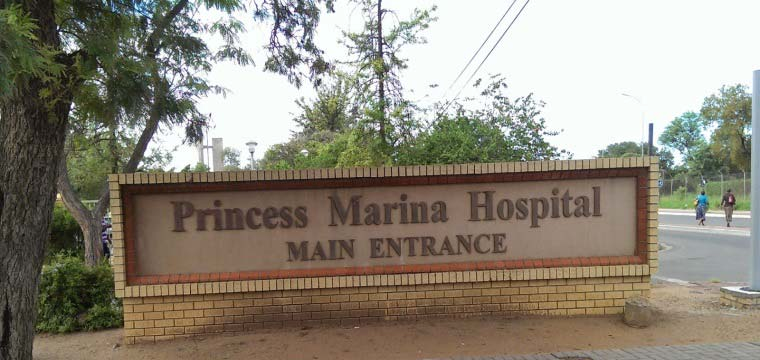
Princess Marina Hospital
Princess Marina Hospital (PMH) is one of two referral hospitals in Botswana reporting to Botswana’s Ministry of Health. PMH has overall bed capacity of 550, employing over 800 allied health professionals. It is the main training sites for medical students and residents from University of Botswana’s Faculty of Medicine. Its Accident and Emergency Department staff are equipped to triage and manage trauma cases, including mass casualty incident capabilities. The department of medicine has on- and offsite multidisciplinary ambulatory outpatient clinics for general internal medicine, cardiology service, endocrinology clinics specializing in diabetes management and a large integrated HIV clinic with over 9,000 patients who also receive routine general medical care including hypertension management. Coordination of clinical service and research activity between the hospital and university is coordinated with the hospital appointing university assistant residency program directors (of academic departmental heads) as clinical heads to foster research at the hospital.
On October 30, 2015, a PMH opened the country’s first multidisciplinary breast clinic. Botswana. The breast clinic sees two groups of patients: 1) patients with suspected breast cancer who have not yet undergone a biopsy, and 2) patients with biopsy confirmation of breast cancer.
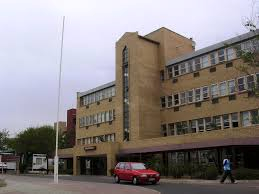
Princess Marina Hospital
The multidisciplinary clinic, unlike the typical clinics evaluating breast mass or breast cancer patients in Botswana, allows for 1) a clear referral pathway for patients with abnormal breast exams or mammogram findings, 2) expedited diagnosis with the active participation of pathologists, and 3) simultaneous evaluation by both surgery and medical oncology.
The clinic is located in the outpatient clinic area (OPD) of Princess Marina Hospital. There is one room available for surgery and pathology evaluations, and a second room available for medical oncology and radiation oncology evaluations. A computer is available in each room with access to IPMS. The initial number of patients booked for each clinic day includes 5 new breast mass patients and 5 new confirmed breast cancer patients; with plans to increases patient volumes over time. Return breast cancer patients are also seen for follow-up. A group of clinic members from surgery, medical oncology, radiation oncology, radiology, pathology, nursing, and palliative care meet in a PMH conference room proximal to the clinic and review each case of confirmed breast cancer. A consensus treatment plan is derived, communicated with the patient on their next visit within 7 days and the plan is implemented.
Facilities, Staffing and Equipment
Helen Joseph Breast Care Centre works as part of a government-funded hospital (Helen Joseph Hospital) providing for patients who have no independent medical funding. The hospital provides services to a region with a population of about 1 million. The medium to low income segment of the population are served by HJBCC. The HJBCC is located at the front of the hospital with good disabled access and consists of a clinic space of 600 sq m, theatre space (one theatre with recovery room, changing rooms and
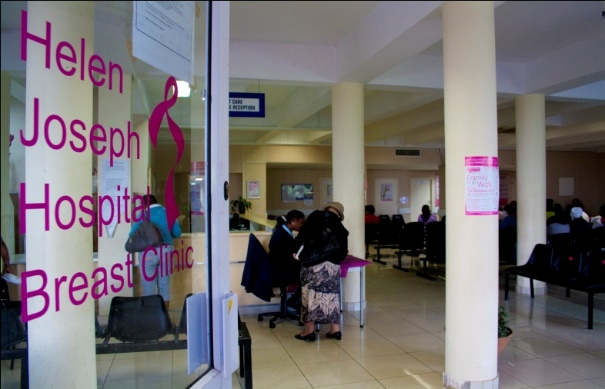
Helen Joseph Hospital- Breast Clinic
consists of a clinic space of 600 sq m, theatre space (one theatre with recovery room, changing rooms and reception but currently not used since inception in 2007) and a 15 bed ward (three and two bed cubicles). Staff consists of two surgeons (Prof CA Benn and Dr S Rayne), 1 community service doctor on yearly contract, and 1 rotating registrar. Reconstruction is provided by 1 plastic surgeon with 2 rotating registrars who divide commitment between breast and general plastic work. There is a complement of approximately 20 nursing staff at different levels, 2 clerks and a cleaning service.
The clinic manages 500-700 patients each month in two weekly specialist clinics. These are open access clinics enabling each woman to be seen within a week of identification of a breast problem: one for all new patients without previous HJBCC attendance and one open access for follow-up patients undergoing investigation and treatment in the HJBCC. These clinics and the ward care are complemented by a Nurse-led dressing clinic run each morning for breast care centre patients with a doctor-led dressing clinic once a week. Our nurses are expert in managing dressings and drains for post-operative patients, as well as explaining and supporting patients in the management of their own wounds and drains. In addition the nurses also manage dressings for our locally-advanced T4 patients, a subset of women who have presented late with fungating or ulcerating wounds.
The clinic space includes a large indoor waiting areas, at least eight private examination rooms, including one room equipped with ultrasound. It also has a counselling room, meeting room, secure store for prostheses and valuable equipment and three offices. All examination rooms are equipped with an examining table, desk, and chairs. The ward is fully functional with each bedside equipped with a bed, chair, curtains, and blood pressure cuff. Non-invasive electronic monitoring is available for patients requiring high-care monitoring. There is a diagnostic room with phlebotomy equipment, space for private consultations and consent.
Clinical services: HJBCC has 10-15 new cancer diagnoses each week. The majority of the patients present as locally- advanced disease and are referred immediately for primary chemotherapy. A further 2-3 patient will undergo Sentinel Lymph Node Biopsy each week, of which two-thirds are positive. We manage three full-day operating lists dedicated to breast cases, with a further general surgery full day list used for some benign cases. Two lists are assigned to breast surgery, both benign and malignant, each week and one list is for onco-reconstructive cases and breast plastic surgery. We carry out approximately 500 operations per year in the main hospital theatre complex.
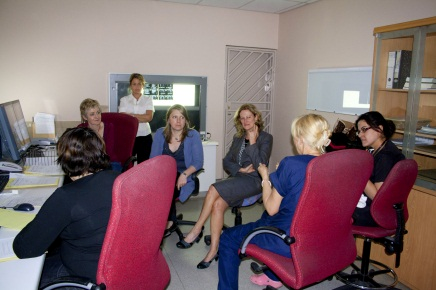
Oncology facilities are centralised offsite five kilometres away and comprise a radiation unit and medical oncology outpatient and inpatient facilities. There is a multi-disciplinary meeting comprising surgeons, medical and radiation oncologists each week to ensure comprehensive care.
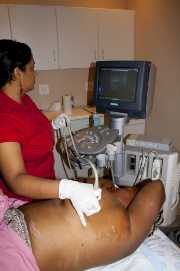
There is a specialist radiology unit with two new tomosynthesis machines (2015), three ultrasound machines, a stereotaxis facility, and a viewing room. There is a small waiting room with tea and coffee available and private changing facilities. Up to 30 patients per day receive diagnostic and screening mammography, multiple core biopsies aspirations, V marker placements and hookwire localisations under stereotactic and ultrasound guidance. In the most monthly audit, 414 patients were seen in one month with 88 procedures carried out. A weekly combined breast meeting ensure that clinical, radiological and histological assessments of each patient correlate and there is an offsite pathology meeting with two specialist breast pathologists.
Pathology utilises the National Histopathological Laboratory Service (NHLS) where all tests indicated in international guidelines are available including Immunohistochemistry, Florescent in situ Hybridisation and Genetic testing. The laboratory takes part in QA programmes from the Australian College of Pathologists.
Data Management
The clinic has available 1 university computer with internet access, 1 donated computer and 2 belonging to the hospital (not for study use) each installed with MS Office 2000/XP, email, 24hr internet access. They are both in locked rooms (8 sq m and 10 sq m) with access only by surgical consultants and team. One printer is available. Shelving and one locked cupboard as present for storage of confidential materials. Dr Rayne has a locked office available, shared with the other surgeon which has internet access. It links with the data management room. There are two landlines available however most communication is carried out on personal cell phones.